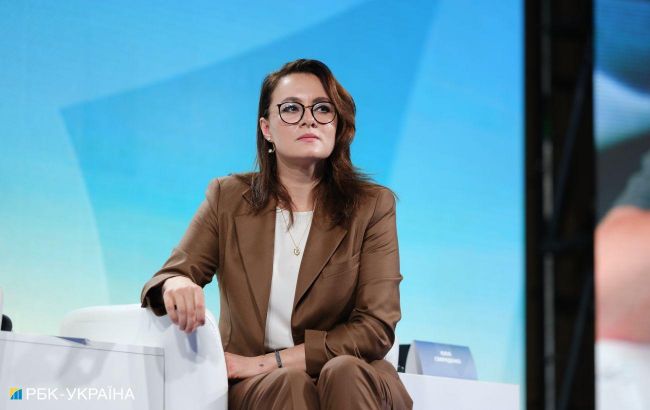Ukraine becomes major testing ground for modern technologies - Economy Minister
 First Deputy Prime Minister and Minister of Economy, Yuliia Svyrydenko (Vitalii Nosach, RBC-Ukraine)
First Deputy Prime Minister and Minister of Economy, Yuliia Svyrydenko (Vitalii Nosach, RBC-Ukraine)
Ukraine has emerged as the largest testing ground for modern technologies, and many international partners are eager to adopt the practical experience gained by Ukrainians, First Deputy Prime Minister and Minister of Economy, Yuliia Svyrydenko, told RBC-Ukraine.
On investments in Ukraine
When asked about attracting investments to Ukraine, considering the potential challenges businesses may face due to tax hikes, Svyrydenko says that "the business community understands that without raising taxes we will not be able to support the security and defense sector."
“We don’t want to surrender a single centimeter of our land, and to achieve this, we need resources. Unfortunately, international aid cannot be used for military salaries or arms purchases. We can only finance the security and defense sectors with internal resources. It’s a difficult but necessary step," Svyrydenko explained.
Regarding investment prospects, she mentions that the defense industry is of the greatest interest to investors. Everyone realizes that post-war Ukraine will have a powerful military and will need to supply itself with weapons.
"Besides, this is a strong expert position. Ukraine, unfortunately, has become now the largest testing ground for modern technologies. We not only have theoretical knowledge of their effectiveness but also practical application experience, which other countries lack. Many partners are keen to learn from this experience," she said.
Svyrydenko believes the field of mine clearance will also develop, considering the increasing number of Ukrainian innovations in this area.
Impact of mined territories on the economy
Many farmers still cannot plant their fields due to landmines, she said. There are calculations on how it affects the economy, particularly the agricultural sector.
"According to the Tony Blair Institute, GDP losses are approximately $11.2 billion annually... We clearly need to find ways to address the challenges that are hindering economic growth," Svyrydenko said.
Farmers, she added, have access to various forms of support, including financing programs like 5-7-9. However, one of the biggest needs remains the demining of agricultural lands, as well as cities and villages, to allow children to return to school safely.
"We launched a pilot project in the Kharkiv region with Palantir to assess the impact of mine contamination on local communities. What did we see? For example, this tool showed that more than 7,000 students and 765 teachers are at risk in the Kharkiv region, as potentially mined areas are located within 15 km of their schools," Svyrydenko shares.
Almost half of the schools are offline, she says, so demining is critical to keeping children safe.
"Now, together with Palantir, we are already fully launching a three-month project in the Kharkiv region to systematically and globally investigate, based on big data, which territories should be demined as a priority," the deputy prime minister said.
Progress in demining is fast enough in her opinion.
"A year ago, together with our partners, we met at the demining forum in Zagreb, Croatia. At that time, we had 18 operators, approximately 3,000 deminers, and 32 demining machines. Today, 58 operators are certified, the number of deminers has increased to more than 4,000, and 98 demining machines are working in the fields," added Svyrydenko.
On economic exemptions
Regarding economic exemptions (a special status for workers and businesses that allows for suspension from mobilization), Svyrydenko was cautious in her response, citing the sensitivity of the issue.
"You know that this is a sensitive issue and I will answer it no longer as the Minister of Economy, who is the main advocate of business. But as the Deputy Prime Minister, who works in a team whose task is to ensure our security and defense sector. I believe that our task is to provide the army with the necessary resources," Svyrydenko concluded.
Recently, The Washington Post reported on a shift in the approach of Ukraine's partners regarding military aid. The EU is gradually moving from a donor role to helping Ukraine develop its own defense industry.
This change was marked by the EU’s decision to allocate $440 million to Ukraine’s defense sector, signaling a significant shift in the bloc's approach to Russia’s war. It particularly highlights the shortcomings of the European Union's defense sector in producing arms and ammunition.
One European diplomat told WP that Europe was not able to produce the weapons that Ukraine needed, so the easiest way for Ukrainians was to do it themselves.

